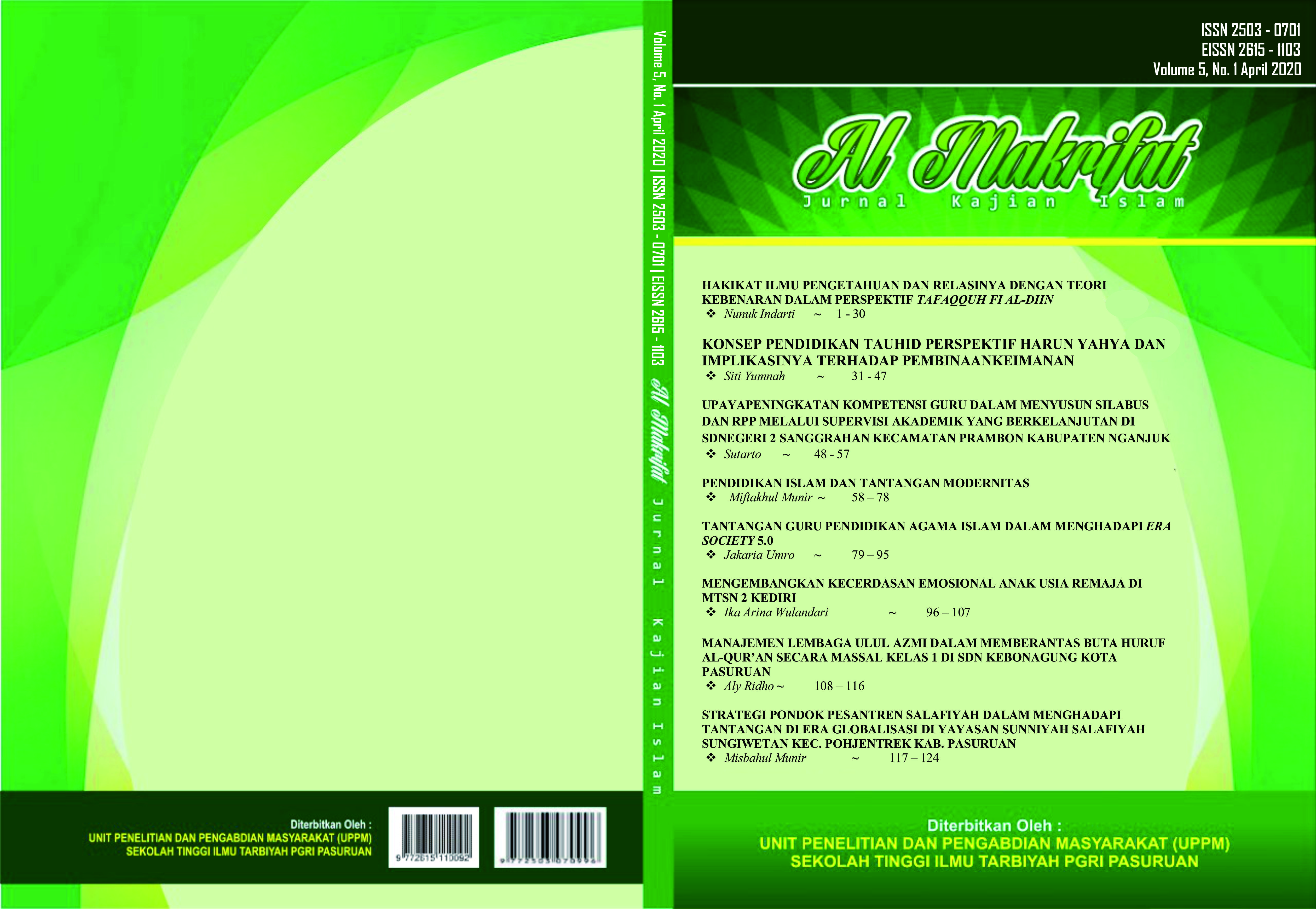Pendidikan Islam dan Tantangan Modernitas
Abstract
The development of the world community in general and Indonesian society in particular has entered the information society which is a continuation of modern society with its characteristics that are rational, future-oriented, open minded, respectful of time, creative, independent and innovative. Whereas information society is characterized by mastering information technology, being able to compete, being curious, imaginative, being able to turn challenges into opportunities and mastering various methods of solving problems. Modern technology that occurred at the beginning of the millennium is popularly called globalization. As a result, this media, especially television, can be used as a very powerful tool in the hands of a group of people or groups to instill or, conversely, destroy moral values, to influence or control one's thought patterns by those who have power over the media. The real problem lies in those who master global communication with extreme perspective differences from Islam in providing criteria of moral values; among good, bad grades,and truth. Globalization as a result of advances in the information sector as mentioned above to world civilization refers to a worldwide influence. Likewise, openness to the flow of information concerning the development of science and technology in this era of globalization has an impact on the community's environment. Various developments and advances in science and technology, such as advances in communication technology, information, and other cultural elements will be easily known by the public. In this context, Amir Faisal stated that education, must be able prepare human resources not only as recipients of global information flows, but also provide provisions for them to manage, adjust and develop everything received through that information, namely creative people and productive people.References
Syar’i, Ahmad. 2005. Filsafat Pendidikan Islam. Jakarta: Pustaka Firdaus.
Musthafa, Asy-Syaikh Fuhaim Manhaj. 2003. Pendidikan Anak Muslim. di terjemahkan oleh Abdilllah Obid dan Yessi HM. Basyaruddin, Jaksel: Mustaqim. 2004. Kairo : Darut-Tauzi’wan-Nsyril Islamiyah.
Azra, Azyumardi. 1994. Pendidikan Tinggi Islam dan Kemajuan Sains" pengantar untuk Charles Michael Stanton, Pendidikan Tinggi dalam Islam, terj. H. Afandi dan Hasan Asari. Jakarta: Logos.
_____________. 1997. Pesantren: Kontinuitas dan Perubahan pengantar un¬tuk Nurcholish Madjid, Bilik-Bilik Pesantren: Sebuah Potret Perjalanan, Jakarta: Paramadina.
Azra, Azyumardi. 1996. Pergolakan Politik Islam: dari Fundamentalisme, Modemisme hingga Postmodernism, Jakarta: Paramadina.
Iqbal, Baca Muhammad. 1966. Membangun Kembali PikiranvAgama dalam Islam, terj. Ali Audah dkk., Cet. I, Jakarta: Tintamas.
Ismail, Faisal. 1996. Paradigma Kebudayaan Islam: Studi Kritis dan Rejleksi Historis, Cet I Yogyakarta: Titian Ilahi Press.
Rahman, Fazlur. 1995. Islam dan Modemitas: Tentang Transformasi Intekktual, terj. Ahsin Mohammad, Cet. II, Bandung: Pustaka.
Asrohah, Hanun. 1999. Sejarah Pendidikan Islam, Jakarta: Logos.
Nasution, Harun. 1991. Pembaharuan dalam Islam. Jakarta: Bulan Bintang.
Muchtar, Heri Jauhari. 2005. Fikih Pendidikan. Bandung: PT Remaja Rosdakarya.
Aly, Hery Noer dan Munzier. 2003. Watak Pendidikan Islam. Jakarta: Friska Agung Insani.
Http://Cairudin.Blogspot.Com/P/Aplikasi-Pendekatan-Konstruktivistik.Html Di akses 13 Desember 2011.
Faisal, Jusuf Amir. 1995. Reorientasi Pendidikan Islam. Jakarta: Gema Insani Press.
Yunus, Mahmud. 1990. Sejarah Pendidikan Islam, Cet VI. Jakarta: Hidakarya Agung.
Suyomukti, Nurani. 2010. Teori- Teori Pendidikan. Jakarta: Ar-Ruz Media.
Madjid, Nurcholish. 1989. Islam Kemodeman dan Keindonesiaan, Cet. Ill, Bandung: Mizan.
Pearson Education. 2003. Longman Handy Learner’s Dictionary Of America English. Edinbourgh : library of congress cataloging.
Hitti, Philip K. 1974. History of The Arabs, London: McMillan & Co.
Tim Dosen Iain Sunan Ampel Malang. 1996. Dasar-Dasar Kependidikan Islam (Suatu Pengantar Ilmu Pendidikan Islam), Surabaya: Karya Aditama.
Suharto, Toto. 2006. Filsafat Pendidikan Islam. Yogyakarta: Ar-Ruz.
Daradjat, Zakiah. 2004. Ilmu Pendidikan Islam, Jakarta: Bumi Aksara.




